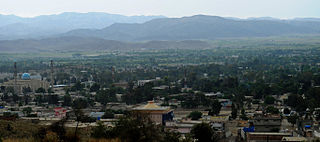
Khōst is the capital of Khost Province in Afghanistan. It is the largest city in the southeastern part of the country, and also the largest in the region of Loya Paktia. To the south and east of Khost lie Waziristan and Kurram in Pakistan. Khost is the home of Shaikh Zayed University. The Khost Airport is located in the eastern area of the city.

Khost is one of the 34 provinces of Afghanistan located in the southeastern part of the country. Khost consists of thirteen districts and the city of Khost serves as the capital of the province. Historically, Khost used to be a part of Paktia and a larger region surrounding Khost is still referred to as Loya Paktia.
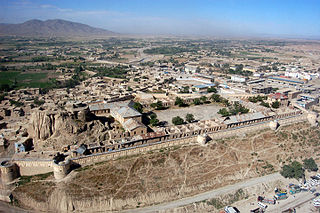
Paktia is one of the 34 provinces of Afghanistan, located in the east of the country. Forming part of the larger Loya Paktia region, Paktia Province is divided into 15 districts and has a population of roughly 623,000, which is mostly a tribal society living in rural areas. Pashtuns make up the majority of the population and a small percentage include Tajiks. Gardez is the provincial capital. The traditional food in Paktia is known as (dandakai) which is made from rice and mung bean or green gram.
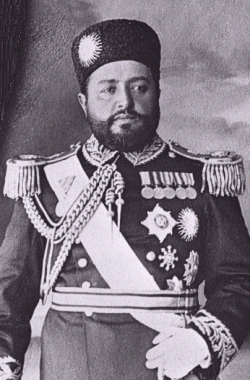
Habibullah Khan was the Emir of Afghanistan from 1901 until his assassination in 1919. He was the eldest son of the Emir Abdur Rahman Khan, whom he succeeded by right of primogeniture in October 1901. His grandfather was Mohammad Afzal Khan.

Jalaluddin Haqqani was an Afghan insurgent commander who founded the Haqqani network, an insurgent group who fought in guerilla warfare against US-led NATO forces and the former Islamic Republic of Afghanistan government that they supported.
Pacha Khan Zadran is a militia leader and a politician in the southeast of Afghanistan. He was a former anti-Soviet fighter and militia leader who played a role in driving the Taliban from Paktia Province in the 2001 invasion, with American backing. He subsequently assumed the governorship of the province. In 2002, he engaged in a violent conflict with rival tribal leaders in the province over the governorship of the province, shelling Gardez City and obstructing two separate appointed governors sent by Hamid Karzai.

A series of occasional armed skirmishes and firefights have occurred along the Afghanistan–Pakistan border between the Afghan Armed Forces and the Pakistan Armed Forces since 1949. The latest round of hostilities between the two countries began in April 2007. Militants belonging to Tehrik-i-Taliban Pakistan and Jamaat-ul-Ahrar also use Afghanistan's territory to target Pakistani security personnel deployed along the border. The Diplomat says that the presence of terrorists belonging to Tehrik-i-Taliban Pakistan on Afghan soil is the reason for sporadic shelling of Afghanistan's territory by Pakistani security forces.
The following lists events that happened during 2002 in Afghanistan.
The following lists events that happened during 2004 in Afghanistan.
Khost International Airport, formerly known as Khost Airport, is located in the eastern section of Khost, which is the capital of Khost Province in Afghanistan. The airport is under the country's Ministry of Transport and Civil Aviation, and is used for domestic and international flights. The Ministry of Defense also uses it for emergency relief purposes such as when the June 2022 Afghanistan earthquake occurred.

Sabari & Yaqubi District is situated in the northwest part of Khost Province, Afghanistan. It borders Musa Khel District to the west, Paktia Province to the north, Bak District to the east and Tere Zayi and Khost districts to the south. Sabari & Yaqubi District has its own governor, who is appointed by the serving governor of Khost Province, and the Afghan National Security Forces (ANSF) are responsible for all law enforcement activities.
The Zadran, also spelled Dzadran or Jadran, Jandran, zadroon, is a Pashtun tribe that inhabits the Loya or greater Paktia region in southeastern Afghanistan and Kurram Agency parts of Waziristan in neighboring Pakistan. "Zadran: Pashtun tribe mainly residing in the “Zadran Arc” a 9-district area encompassing portions of the Khost, Paktia, and Paktika and Pakistan’s Kpk Balochistan Punjab provinces."
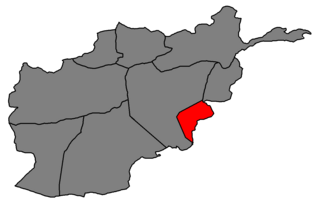
The Khost rebellion, also known as the 1924 Mangal uprising, the Khost revolt or the Mangal Revolt was an uprising against the Westernization and modernizing reforms of Afghanistan’s king, Amanullah Khan. The uprising was launched in Southern Province, Afghanistan, and lasted from March 1924 to January 1925. It was fought by the Mangal Pashtun tribe, later joined by the Sulaiman Khel, Ali Khel, Jaji, Jadran and Ahmadzai tribes. After causing the death of over 14,000 Afghans, the revolt was finally quelled in January 1925.

Zēṛōk, also known as Ziruk, is the main town of Zerok District in Paktika Province, Afghanistan. It is located within the heart of Zadran land on the main Khost-Urgun road.
The 2018–19 Mirwais Nika Provincial 3-Day was the first edition of the Mirwais Nika Provincial 3-Day tournament, a first-class cricket competition in Afghanistan, that ran from 15 February to 15 March 2019. The five competing provincial sides were representing their regions after having come through regional qualifying events. In the final, the match finished as a draw, with Kabul Province declared as the winner, after taking a first innings lead.
The Khost rebellion was a rebellion in Khost that took place in 1912 in the Emirate of Afghanistan, and was the only serious crisis during the reign of Habibullah Khan.
Abd-al Karim (1897–1927) was an Afghan emir who ruled only in the Southern Province from July 1924 to January 1925.
The 2019 Afghanistan Provincial Challenge Cup was a List A cricket competition that took place in Afghanistan between 31 July and 10 August 2019. It was the third year of domestic List A cricket to be played in Afghanistan, following the announcements by the International Cricket Council (ICC) in February and May 2017. Eight teams qualified for the tournament, and were divided into two groups of four.
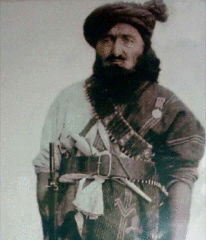
Babrak Khan was a Zadran chieftain who was the father of Said Akbar Babrak and of Mazrak Zadran.
On 16 April 2022, the Pakistani military conducted predawn airstrikes on multiple targets in Afghanistan's Khost and Kunar provinces. Afghan officials said the attacks killed at least 47 civilians and injured 23 others. Initial reports described the attacks as either rocket strikes or aerial strikes carried out by a number of aircraft of the Pakistan Air Force, and Afghan officials claimed the operation was carried out by Pakistani military helicopters and jets. Pakistani officials initially denied Pakistan carried out the airstrikes, but Pakistani security officials later claimed the airstrikes involved drone strikes from inside Pakistani airspace, and that no aircraft were deployed. Some reports said the Pakistani airstrikes also targeted parts of Paktika Province.











